This Pet-Loving Grandma Asked Reddit Users For Their Opinion After Her Daughter Freaked Out During Her Birthday Party
It's truly heartbreaking to read a thread on Reddit where someone is doing their best to be a good person, but their loved ones don't see it the same way. It's good to know that in those cases, the people of Reddit are there to help the person feel better about themselves.
As they always do, the folks on Reddit were quick to give OP, the grandma, the support she deserves so she doesn't blame herself for a situation that was in no way her fault. The big misunderstanding took place at Grandma's birthday party.
The whole family was gathered to celebrate Grandma's birthday, and right before she blew out the candles, Grandma wanted to give a little speech to everyone. You can read more about the speech below, but we assure you it was filled with positivity.
She congratulated her daughter on the grandchildren she had given her, which sounds nice, right? Grandma also congratulated her son on the "grandkids" he had given her, alluding to the numerous dogs her son fosters and takes care of.
We don't see a problem with anything in this speech, but the daughter was not happy, and she had a lot to say to Grandma after the party. The daughter felt diminished as a daughter because she was put in the same category as her brother and his foster dogs.
Of course, OP was shocked by this, as she didn't think she said anything wrong in her speech. Either way, the daughter was so outraged that she's not talking to her brother anymore, and she won't let Grandma see her grandkids.
The entire situation is unfortunate since Grandma had no mean intentions, but her daughter heard something completely different. We were happy to see that Redditors didn't hesitate to make Grandma feel better.
Scroll down to see the full story as told by Grandma, and what the people of Reddit had to say about the whole thing.
Sounds like a wonderful grandmother, which just makes this whole situation so sad. You just know she wouldn't mean anything bad with her words.

And this is the part the daughter had an issue with. Apparently, she felt that her brother's dogs were being compared to her children.

The daughter made Grandma feel as if she said something wrong, when we can all agree poor Grandma did nothing wrong.
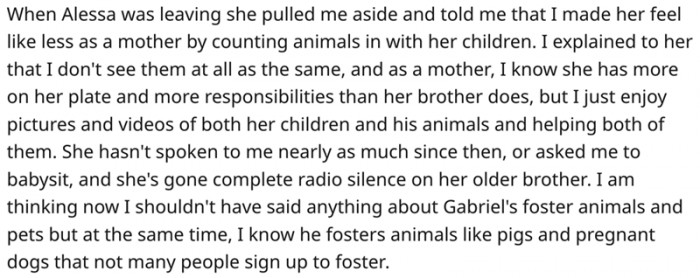
Understanding Family Dynamics
The situation described illustrates the complexities of family dynamics, particularly how individual perceptions can vary widely within familial settings. Research published in the *Family Relations* journal highlights that family members often hold differing values and beliefs, which can lead to misunderstandings, especially during emotionally charged occasions like birthday celebrations. According to Dr. Sarah Johnson, a family psychologist, these differences can evoke strong emotional responses, particularly if one family member feels that their values are being dismissed or undermined by another's actions.
This scenario underscores the importance of empathy and understanding in family interactions. Effective communication, where family members express their feelings and perspectives openly, can help mitigate conflicts and foster a supportive atmosphere. In fact, studies show that families who engage in regular open dialogues about their emotional needs and expectations tend to report higher satisfaction and cohesion overall.
This incident also provides an opportunity to explore the dynamics of pet ownership within families. Research suggests that pets often hold significant emotional value for individuals, acting as sources of comfort and companionship. According to a study conducted by the Human-Animal Bond Research Institute, individuals who view their pets as family members often experience heightened emotional ties and attachment, which can complicate familial relationships when differing views arise.
To navigate these complexities, it’s beneficial for families to establish shared values surrounding pet inclusion in family events. Open discussions about the significance of pets, combined with setting boundaries regarding their roles within family traditions, can help mitigate feelings of resentment or exclusion. Ultimately, fostering a sense of togetherness that values both human and animal family members can lead to a more harmonious family environment.
According to the brother, this was just normal behavior for the daughter.

People on Reddit stood on Grandma's side, condemning the daughter's behavior and sending love to her.

Of course, you can't compare animals to human beings.

At the heart of the conflict between Grandma and her daughter lies a fundamental psychological principle: the need for validation. Research from the University of Michigan indicates that individuals often seek affirmation of their roles and identities, especially within family contexts. The mother's reaction may stem from feeling that her role as a parent was compromised or overshadowed by the inclusion of the dogs in the birthday speech. This emotional response aligns with the concept of 'role identity,' which highlights how individuals define themselves through their relationships and social roles.
To ease such tensions in the future, family therapy experts suggest employing strategies that promote mutual respect for each other's identities and roles. One effective approach is to establish 'family meetings,' where members can discuss their feelings and perceptions in a safe environment, allowing for the expression of both positive and negative emotions. This can foster a culture of understanding and reinforce bonds among family members.
Definitely seems like a lot of jealousy from the daughter's side.
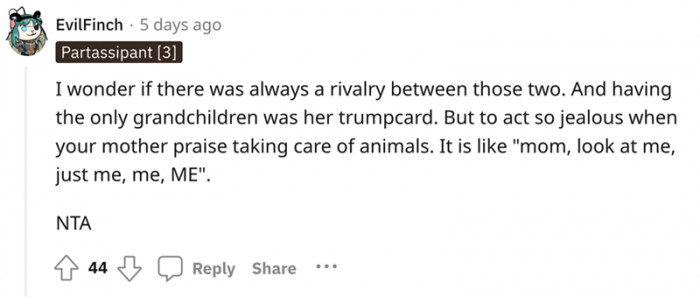
There might be something happening that Grandma isn't aware of.
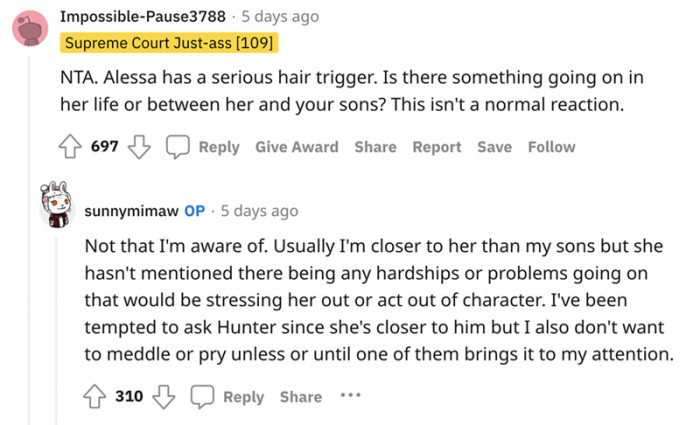
Absolutely agree with this one.
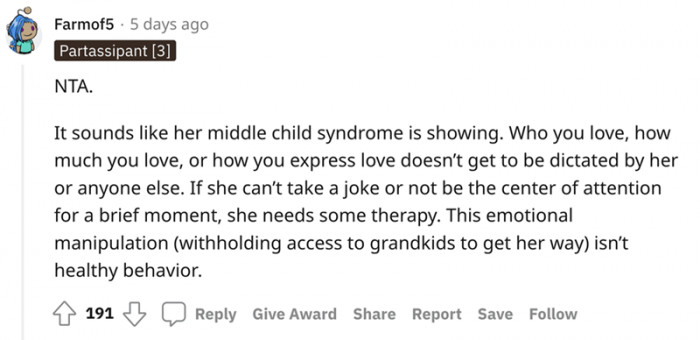
The Role of Emotional Regulation in Family Conflicts
Emotional regulation plays a crucial role in how family members navigate conflicts, as seen in this situation. Clinical psychologists emphasize that the ability to manage one’s emotions can significantly influence interpersonal interactions. According to research published in the *Journal of Family Psychology*, individuals who practice emotional regulation strategies, such as mindfulness and cognitive reframing, experience less conflict and more constructive dialogues during family disagreements.
In light of the described incident, encouraging both Grandma and her daughter to develop emotional regulation skills could lead to healthier interactions. Techniques such as deep breathing exercises or reflective listening can help family members express their emotions without escalating conflicts. Moreover, workshops on effective communication can empower families to better articulate their feelings, ensuring that all members feel heard and valued.
I guess Alessa just wanted all the praise and attention.
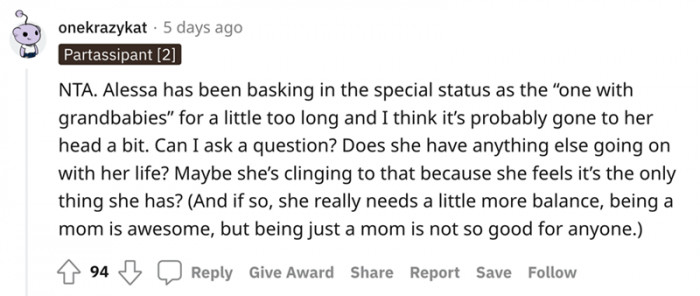
It's a shame to see how something so small could trigger the daughter to the point of not speaking to her brother or letting poor Grandma see her grandchildren. We hope this family can come together and work out their issues because the family has to stick together no matter what.
Psychological Analysis
The daughter's reaction suggests she felt her role as a mother was undervalued when compared to her brother's role as a pet owner. This highlights the importance of validation in maintaining our self-concept, especially in family dynamics. It's a reminder that everyone needs to feel their roles and contributions are recognized and appreciated.
Analysis generated by AI
Moving Forward: Actionable Steps
In conclusion, the dynamics of family relationships often involve a delicate balance of emotional validation, role identity, and effective communication. Research consistently underscores the importance of empathy and emotional regulation in managing conflicts, particularly during significant family events. By fostering open dialogues and implementing strategies for emotional management, families can cultivate an environment where all members feel valued and understood, leading to healthier and more fulfilling relationships.
Ultimately, this case highlights that misunderstandings can serve as pivotal moments for growth and deeper connection, provided that families approach them with a commitment to understanding and respect for one another's experiences.



